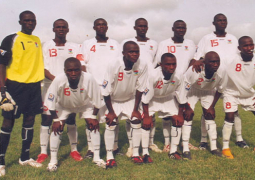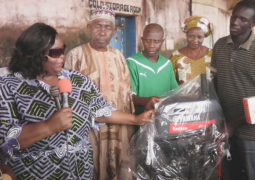The
University of The Gambia School of Journalism and Digital Media in
collaboration with Francis DeGaulle Njie Foundation yesterday held a panel
discussion on the role of journalism in national development.
The forum, geared towards the creation of foundations for professional journalism in The Gambia, was held at Banjul Reform Club at MDI Road in Kanifing. It was attended by university and high school students, and members and well-wishers of the Degaulle Njie foundation, among others.
The four-hour panel discussion was organised in honour of the late Isatou Mboge who died on 10 January 2016, at the age of 30. The late daughter of Alaba Thomas and Alieu Mboge was passionate about media and culture, and girls’ empowerment through education.
Vivat Thomas-Njie, chairperson of Degaulle Njie foundation, said the forum was aimed at honouring the legacy of their beloved daughter and sister who had a great passion for communications.
She commended the School of Journalism for the initiative and partnership in organising the forum, saying there are plans to make it an annual event.
In a paper on ‘The history of women in journalism in The Gambia’, Nana Grey Johnson, dean of the School of Journalism, said the history of Gambian journalism is full of women who weathered the storm and excelled in their journalism careers.
The dean challenged the young ladies in the media and those aspiring to make a career in journalism to research about these women, take a cue from them and in follow their footsteps.
A senior lecturer at the School of Journalism, Gheran Senghore, said citizens have now become active participants in reporting news, thanks to social media.
Delivering a paper on ‘The promotion of security through citizen journalism’, Mr Senghore said the rise of citizen journalism in The Gambia has to do with the stringent rules and regulations put in place by the government to control the mainstream media.
Emil Touray, president of the Gambia Press Union, harped on the topic ‘Placing the journalist in the grid of The Gambia’s economic development’.
Mr Touray said one of the criticisms against the Gambian media is that coverage is mainly centred on the urban areas, calling it urban journalism.
He said the Gambian media, in that vein, is apparently failing in one of the fundamental tenets of journalism, giving voice to the voiceless, because the journalists hardly go to the rural areas to cover the stories of the rural dwellers.
Famara Fofana, a-second-year student at the School of Journalism, said the journalism school of the university came at a time when a lot of young people are pursuing careers in the media without any sort of professional or academic training in journalism.
In a paper on ‘The role of SJDM [the school of journalism] as the crucible for development journalism as a profession’, Mr Fofana said the school is an ideal ground to create and nurture young men and women of integrity, diligence, courage and a responsible mindset to become journalists in the country.
The panel discussion ended with a question and answer session, where the audience had the opportunity to ask questions and seek clarifications on any area that was not clear.



